
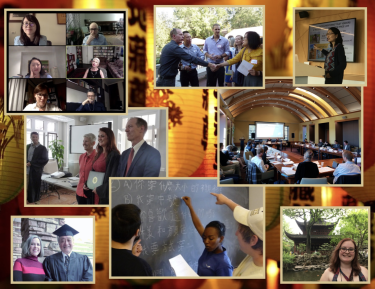
Center for Asian Studies Event and Fundraiser
Wednesday, December 1 at 5pm MST
CAS invites you to our first ever virtual fundraiser on Wednesday, December 1 at 5 pm US mountain time. We aim to raise $25,000 for our speaker series. Join us as we highlight three of our faculty affiliates talking about their exciting and timely research. The event is free to attend, but we do hope you'll donate to this important effort.
Stephanie Su
Assistant Professor, Art and Art History
Ladies Sewing: Women, Color, and Modernity
Aun Hasan Ali
Assistant Professor, Religious Studies
Studying Islam in the Age of Anger
Lauren Collins
Program Director and Instructor, Asian Studies
Insights from Teaching Asian Studies
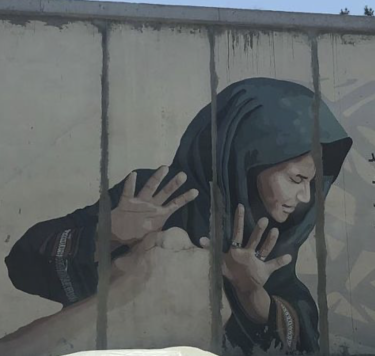
Reflections on the Tragedy of Afghanistan
By Jennifer L. Fluri
Afghanistan garnered a significant share of media attention when the Taliban took control of the capital city, Kabul. This attention continued during the subsequent chaotic and disorganized US-led evacuation of American citizens and some but not all Afghan allies. As someone who has been researching gender, economic development, conflict, and security in Afghanistan for two decades, I was also struck by the way the “saving Afghan women” narrative, established by the Bush Administration in 2001, resurfaced. While women suffered physically, economically, and emotionally under the Taliban, the prescriptions for improving women’s lives in Afghanistan through economic development and humanitarian aid programs regularly imposed values incongruent with those held by many Afghan communities. The unrelentingly narrow representation of Afghan women as a single category both simplified and curtailed a robust understanding of women’s diverse experiences and articulations of their own needs and desires.
While much of the public criticism of the US evacuation focuses on what women will lose now that the Taliban is back in power, precious little critique has been placed on the failings and falling short associated with US-led interventions over the past 20 years. First, let’s identify the successes. Many Afghan women have benefited from internationally funded projects and programs focused on education, job skills training, and health care. Also, Afghan women’s participation in politics since 2002 was partially due to quotas that included positions for women in both the upper and lower houses of parliament. Women also held political office as provincial governors and district/city mayors, along with being chosen by different presidents as minister or holding cabinet positions. With the fall of the US-backed Afghanistan government, these positions along with those held by Afghan men are gone or radically altered. Therefore, focusing on women and the changes to their lives during the Taliban regime remains an important discussion, but should include extensive criticism of US-led international military, humanitarian aid, and economic development assistance.
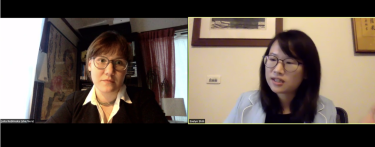
Last Year's Engaging Annual Events Theme
By Evelyn Shih
From December 2020 to May 2021, CAS held a yearlong lecture series around the theme of “Sound and Noise in Asia.” Following a two-day symposium held in November, the series highlighted sound/noise practices and aesthetics from East Asian broadcast media such as radio and television; the representation of sound and noise in literature; film sound aesthetics; environmental noise practices; the circulation of recording media such as cassettes; and postcolonial sonic space making. The talks were spread across the regions represented at CAS, with topics ranging from Chinese film to Cambodian rock, Indian literature, and Middle Eastern cultures in diaspora.
Held virtually, the lecture series brought attention to the field of sound studies not only at CU Boulder, but also in the broader Asian studies community. Each speaker brought together different groups of scholars and students for academic discussion. As a part of the University mission for diversity, equity, and inclusion, the series not only aimed for geographic and cultural diversity, but also featured women of color.
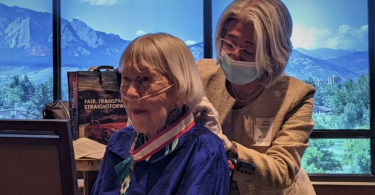
Celebrating Joyce Lebra's Contributions
Joyce Lebra, a professor emerita in the History department, passed away on October 10. Professor Lebra was the first woman in the United States to receive a doctorate in Japanese history. She taught Japanese history at CU Boulder for 29 years. Lebra was recognized for her contributions to academic exchange and mutual understanding between the U.S. and Japan with an imperial commendation from the Japanese government in September. She received the Order of the Rising Sun, Gold Rays with Neck Ribbon. Learn more about her extraordinary life below.
Joyce Lebra: Trailblazing scholar and witness to Japanese history - Japan Times
‘CU legend’ Joyce Lebra honored by Japanese government
An Asian Attachment: Honoring the Life and Work of Joyce Chapman Lebra - YouTube
Keene/Lebra Interview 24 Dec 2012 - YouTube
Edward G. Seidensticker Japan Summer Research Grant Report by Zhujun Ma
Thanks to the financial support from the Edward G. Seidensticker Japan Summer Research Grant, I was able to join the summer Japanese language program Princeton in Ishikawa, which lasted from June 11 to August 6 in 2021. Through its intermediatory course covering the textbooks Nakama 2: Japanese Communication, Culture, Context, and Tobira: Gateway to Advanced Japanese, I received adequate training and practice in grammar in order to enhance my level in reading, writing, listening, and speaking. This enables me to roughly understand academic writings in Japanese and include Japanese scholarship into the research of my thesis, which is mainly focused on the worship of the Goddess of Mount Tai and female agency in late imperial China. Thanks to this program’s preparation and my advisor’s recommendation, I am also lucky to join an informal seminar Japanese for Sinologists in 2021 fall to continue to explore Japanese academic reading and translation. I highly appreciate the Seidensticker Scholarship and Center for Asian Studies’ generous help for me to study more about the Japanese language and culture, which I believe will greatly facilitate my Ph.D. application in 2021 fall and future endeavors in the studies of Chinese religions and Asian studies.
Zhujun Ma is a Dual MA student in Religious Studies and Asian Language and Civilizations. Her research mainly focuses on Chinese religions and gender.
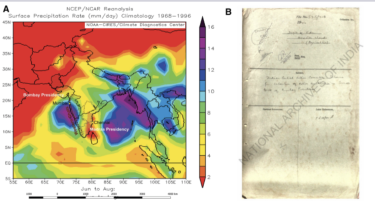
CAS Faculty Affiliate Atreyee Bhattacharya's
Article in Nature Magazine
Using information contained in the eighteenth to twentieth century British administrative documents, preserved in the National Archives of India (NAI), we present a 218-year (1729–1947 AD) record of socioeconomic disruptions and human impacts (famines) associated with ‘rain failures’ that affected the semi-arid regions (SARs) of southern India. By mapping the southern Indian famine record onto long-term spatiotemporal measures of regional rainfall variability, we demonstrate that the SARs of southern India repeatedly experienced famines when annual rainfall reduced by ~ one standard deviation (1 SD), or more, from long-term averages. In other words, ‘rain failures’ listed in the colonial documents as causes of extreme socioeconomic disruptions, food shortages and human distress (famines) in the southern Indian SARs were fluctuations in precipitation well within the normal range of regional rainfall variability and not extreme rainfall deficits (≥ 3 SD). Our study demonstrates that extreme climate events were not necessary conditions for extreme socioeconomic disruptions and human impacts rendered by the colonial era famines in peninsular India. Based on our findings, we suggest that climate change risk assessment should consider the potential impacts of more frequent low-level anomalies (e.g. 1 SD) in drought prone semi-arid regions.
Atreyee Bhattacharya is a paleoclimatologist who studies the nature, causes and socioeconomic impacts of climate variability in semi-arid climate hotspots of the global south. Atreyee currently hold a research faculty appointment at the University of Colorado, Boulder
